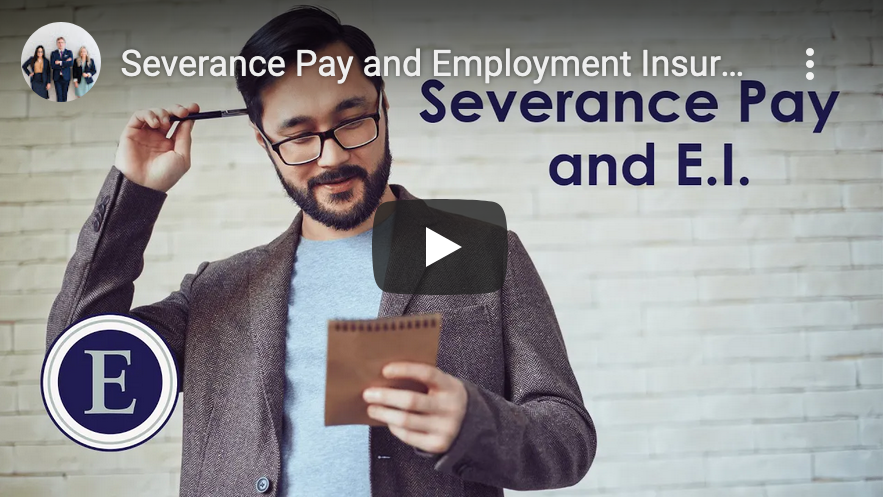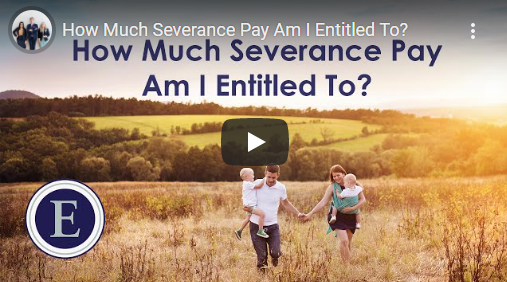Terminated Without Cause

Terminated without cause (Intro)
This article will discuss what it means to be terminated without cause, examples of terminations without cause, and what an employee might be entitled to when terminated without cause.
We will also answer questions related to severance pay and employment insurance.
After reading this article, Ertl Lawyers offers a free consultation if you wish to discuss your matter—no strings attached. No obligation.
We also offer fair and flexible billing options, like contingency fees (don’t pay unless you win).
I was terminated without Cause. What does it mean?
A without cause termination means a termination for any reason other than cause or just cause.
If you are terminated without cause, you are entitled to notice or pay instead of notice (often called severance pay).
Conversely, if you are terminated with cause or with just cause, the employer is taking the position that you have engaged in misconduct so serious that it does not have to provide you notice or severance pay.
If I am terminated without cause, am I entitled to know why?
No. The law does not require employers to provide a reason for a termination without cause.
The law merely requires that the employer provide proper notice or severance pay.
If the employer does not provide proper notice or severance pay, the termination is considered a “wrongful dismissal”. To be clear, “wrongful” has nothing to do with the reasons for your dismissal.
What are common examples of terminations without cause?
Most employers provide some brief explanation for terminating employees without cause.
Common examples include:
“Restructuring”
“Lack of work”
“Business reasons”
“Not a good fit”
“Business is closing.”
What if the reason for my termination without cause is a lie?
Sometimes, employers might provide a reason for termination that isn’t precise, accurate, or true.
Does it matter? Not really.
If the employer elects to terminate you without cause, it can terminate you for any (or no) reason whatsoever. It doesn’t have to explain. It can even make up a reason. Its sole obligation is to provide proper notice or severance pay.
There is a caveat: It is a violation of certain legislation to terminate an employee for discriminatory reasons or in retaliation, for example, for the employee raising certain rights.
For example, under most provincial human rights legislation, including Ontario and Nova Scotia, an employer cannot terminate you on account of any of the following grounds:
- citizenship
- race
- place of origin
- ethnic origin
- colour
- ancestry
- disability
- age
- creed
- sex/pregnancy
- family status
- marital status
- sexual orientation
- gender identity
- gender expression
- record of offences
Moreover, an employer cannot retaliate by terminating you because you raised or asserted your rights under human rights legislation.
Further, under Ontario’s Employment Standards Act, some “leaves” are considered job-protected leaves (like parental leave, maternity leave, family medical leave, etc.) This means it is unlawful to terminate someone because they took that leave.
However, employees on job-protected leaves can be terminated provided the employer has a legitimate business reason.
What makes a termination without cause a “wrongful dismissal”?
Your termination becomes wrongful when your employer does not provide proper notice or severance pay.
Again, the “reason” for your termination does not make it “wrongful”.
Terminated without cause: What am I entitled to?
With limited exceptions, all non-unionized employees terminated without cause are entitled to notice or pay in lieu (often called severance or termination pay).
The amount of notice or severance pay is determined by:
Provincial employment legislation
- Sets out the bare MINIMUM you are entitled to
- Usually between 1 week and eight weeks
- Amount depends solely on your length of service
Employment contract
- Your contract might contain a termination clause
- Provided the clause is clear and enforceable, you get what the termination clause says
- The clause can never provide for less than the provincial minimum
- For a variety of reasons, termination clauses are often void or unenforceable
You’ll need an experienced employment lawyer to review the contract and your severance offer before you take any further steps.
Common law
- Applies in the absence of a written and enforceable termination clause
- Sets out the MAXIMUM you might be entitled to
- Based on the concept of “reasonable notice”
- In almost all cases, it is more generous than employment legislation minimum
- Can be as much as 24 months of pay
- Calculation considers factors such as age, length of service, type of job, employability
How is common law notice or severance pay calculated?
The notice or severance pay should roughly equate to “how long it will take you to find a comparable job.” It is not designed to reward you.
We’ve created a severance pay calculator tool to help you estimate your potential severance pay entitlements.
The law considers several factors to determine what a person terminated without cause is entitled to.
Those factors are called Bardal Factors. They came from a case called Bardal v. Globe & Mail Ltd., 1960 CanLII 294 (ON SC).
The main Bardal Factors are:
Age: the older you are, the more severance you are likely entitled to
Length of service: the longer you work for an employer, the more severance you are likely entitled to
Character of position: managers tend to get more severance than non-managers, but not always
Availability of comparable jobs in the marketplace: the more jobs available to you, the less severance you are generally entitled to
Other factors the law can consider include:
- Health of the employee
- If the employee has limited skills or training
- Length of time with a single employer
- If the employee’s job is considered specialized
- If the employee was induced to leave secure employment
… and more.

What will I find in a without cause termination letter?
Here are some everyday things you will find in a termination letter:
• Effective date of termination
• What your automatic statutory entitlements are
• How your health benefits will be treated
• How your pension or RRSP will be treated
• Provision of career-counseling services
• Reminder of non-compete or non-solicitation obligations
• What amount of money (in addition to the statutory entitlements) the company is willing to offer you
Terminated without cause: employment insurance (EI)
If you’ve terminated without cause and accrued sufficient insurable hours, you are generally entitled to employment insurance benefits.
Regardless of how much notice or severance pay you get, it is best to apply for EI benefits soon after your termination.
My employment was terminated after 23 years. Ertl Lawyers were able to get me a severance package that bridged me to retirement.
– C.B., Insurance Claims Specialist, Halton Hills
Have you been terminated without cause?
Get the severance pay you deserve.
If you were terminated without cause, you can call us for a free consultation.
We will tell you whether your severance package is fair or not, whether you are entitled to more, how much you might be entitled to, and answer any other questions you may have.
Our help can make all the difference!
Related Blogs
What To Know About the Employment Equity Act in Canada
If you want a summary of the intent behind Canada's Employment Equity Act (EEA), you need not look any further than section 2 of the EEA, the "Purpose of Act" (last updated in 2017): "The purpose of this Act is to achieve equality in the workplace so that no person...
Performance Improvement Plans in the Banking Industry
At face value, performance improvement plans (PIPs) are meant to be a tool that helps struggling employees meet specific performance-related goals. In the banking and finance industry, this commonly means meeting targets and sales quotas of various financial products....
Working Notice in Ontario
Suppose an employer wants to end an employment contract without cause in Ontario, and the employee has worked with them for at least 90 days. In that case, the employee is entitled to a minimum amount of notice that their job will end on a specific date in the future...






